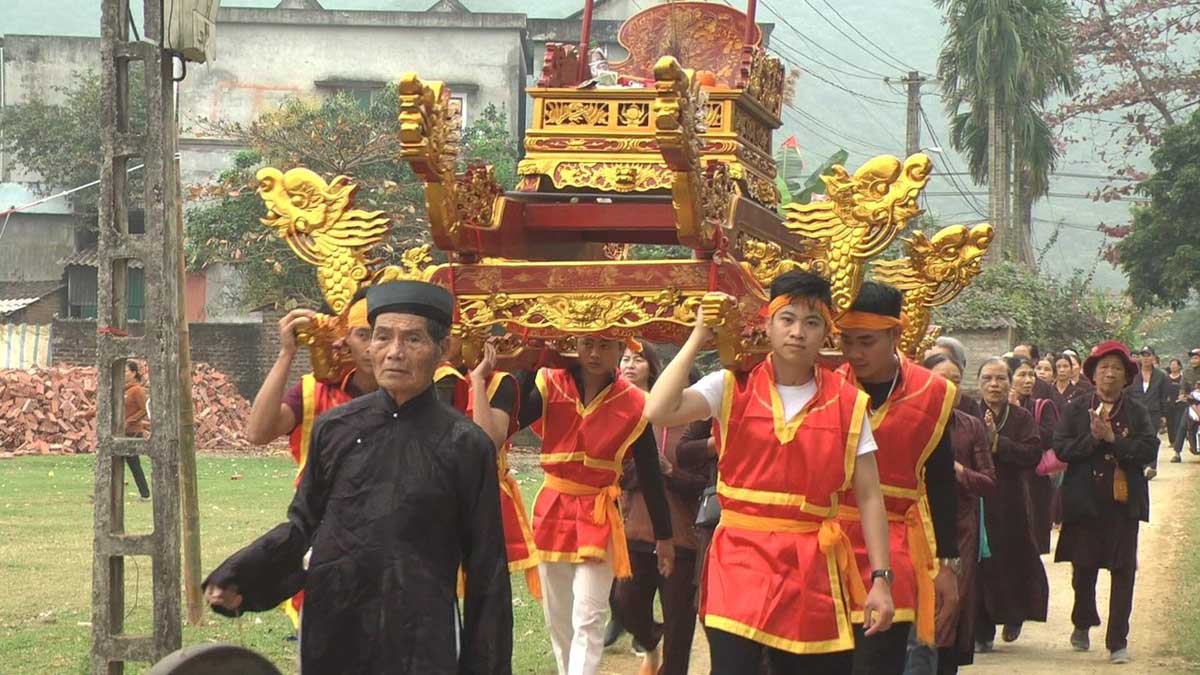
(HBO) - In the tourism development plan to 2020, with a vision to 2030, Yen Thuy set a goal of turning the district into a key attractive and safe spiritual and religious tourist destination of the locality.
 The Lieu communal house festival in Yen Thuy district’s Ngoc Luong commune is held every
year, attracting thousands of local tourists and those from other localities.
The Lieu communal house festival in Yen Thuy district’s Ngoc Luong commune is held every
year, attracting thousands of local tourists and those from other localities.
Good work in
preserving and promoting the value of traditional culture identities through the forming of public art clubs has contributed to
building a deep tourism image of the locality. The district has so far had 115 grassroots
art troupes.
According to Vice Chairman of the district People’s Committee Bui Van Hong, to
realise the set goals, the locality has given priority to developing infrastructure
facilities for tourist sites.
Notably, in the 2016-2020 period, the district has paid heed to mobilising
investment and integrating projects to upgrade a number of roads, while expanding
tourism markets, diversifying tourist products, promoting the locality’s image and
building tourist brands.
There is a traditional village specialising in producing liquor in Dinh hamlet,
Phu Lai commune, recognised by the provincial People's Committee. The district
is also home to 20 cooperatives producing clean agricultural products for
tourism development.
The district
has also actively participated in investment, trade and tourism promotion
activities, and regularly coordinated with communications agencies to promote its
landscapes, historical sites and traditional festivals.
Communications campaigns have been arranged to raise the awareness of locals
and tourists of the importance of protecting the environment.
Works for
waste treatment, clean water supply, environmental protection and climate
change response have been constructed in areas prioritised for tourism
development.
Meanwhile, the application of technologies has been promoted in tourism
business activities.
In
2020, the COVID-19 pandemic caused heavy
impact on the district’s tourism sector. Yen
Thuy district served 5,500 visitors in 2020, earning 4 billion VND in revenue,
equal to 33.33 percent of the plan set for the year.
Local authorities have implemented many solutions to
revitalise tourism activities and expand the tourism market, aiming to attract not
only spiritual tourists and pilgrims, but also travelers to natural landscapes
and ecotourism sites.
Attention will be continuously given to preserving and embellishing historical
and cultural values, and landscapes, and typical intangible cultural heritages;
and developing craft villages and popularising local specialties to visitors./.
Located just a 20-minute drive from Hoa Binh City, Ora Hill Farmstay & Glamping Hoa Binh is a captivating new destination nestled in Mo hamlet, Bình Thanh commune, Cao Phong district. Combining farming with leisure, this tranquil retreat is perfect for those seeking balance, joy, and an immersive experience in the expansive beauty of nature.
Muong Bi - Tan Lac is renowned as one of the four famous Muong regions in Hoa Binh province. Blessed by nature with a favourable climate and stunning landscapes, Tan Lac holds great advantages for tourism development. The local tourism industry has made remarkable strides in recent times thanks to the attention and support from the local authorities and sectors.
With its strategic location, well-developed transport network, and diverse soil and climatic conditions, Hoa Binh is emerging as a must-visit destination in Vietnam's northwestern tourism corridor. The province boasts numerous attractions, including the Kim Boi hot springs (Kim Boi district), the Dau Rong cave complex (Cao Phong), the Mai Chau valley (Mai Chau), and the iconic Hoa Binh hydropower plant.
The northern mountainous province of Hoa Binh has been listed among the 71 most beautiful places to visit worldwide by the prestigious US travel magazine Condé Nast Traveller.
Hoa Binh province’s rich natural and cultural resources position it as a prime location for developing community-based tourism (CBT). In recent years, support from central and provincial policies, as well as assistance from non-governmental organisations, have encouraged local ethnic minority and mountainous communities to actively engage in the sector.



 The Lieu communal house festival in Yen Thuy district’s Ngoc Luong commune is held every
year, attracting thousands of local tourists and those from other localities.
The Lieu communal house festival in Yen Thuy district’s Ngoc Luong commune is held every
year, attracting thousands of local tourists and those from other localities.